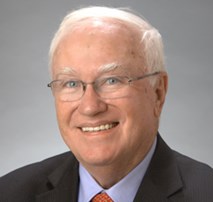5 minutes with... Bob DuPuy

When did you decide to become a lawyer? Why?
By my senior year in high school I knew I wanted to be a lawyer. At that time I had some thought that I wanted to stay in Connecticut and eventually enter the political arena and law school seemed liked the right training. High school chemistry and physics and an aversion to blood convinced me med school was not an option.
Starting out, what did you expect from a career in the law?
1) The ability to support my family. 2) To have a career in a profession I cared about and to become an effective advocate for my clients.
Has it lived up to your expectations?
Being a lawyer has more than met my early expectations. The first 15 years of my career I was blessed to have interesting clients and fascinating disputes to resolve: First Wisconsin National Bank, Gulf Oil, Allis-Chalmers, JI Case all were great clients with complicated business problems. The last 25 years being involved with Major League Baseball and a sports practice have been an incredible experience on a daily basis. And being able to teach law students at a number of terrific law schools over the past 20 years has been personally very rewarding.
How did you get into the areas of law you are known for today? By design? Chance? Both?
Clearly by serendipity. Having done some work for the Milwaukee Brewers and working closely with a senior partner David E. Beckwith, who had a relationship with Bud Selig, got my foot in the Major League Baseball door. I never thought going to work in Milwaukee, Wisconsin that I would end up representing a major sports league.
What do you consider to have been your big break?
Being retained to step in and handle and ultimately resolve the collusion cases brought by the players against the owners in Major League Baseball in 1988.
What differences do you see in today's legal market compared to when you started?
1) Lawyer mobility. 2) Client involvement, expertise in virtually every matter. 3) The use of multiple firms based on their expertise by major corporate clients. 4) The pervasiveness of technology which has made our lives so much better but which as an unintended consequence has reduced lawyer collegiality and collaboration and has cut back on the ability to think through problems and provide what is our highest and best use as lawyers: judgment and counseling.
What achievement are you most proud of?
Spending two years on the successful creation and establishment of MLB Advanced Media, baseball’s website, the first time in 150 years that MLB teams were willing to voluntarily surrender a team asset for its potential collective impact.
What do you consider your greatest failure or regret?
I have no regrets but do still feel badly about losing a trial to a pro se advocate early in my career. The call to the client was very painful and made me wonder if was in the right discipline.
What have you enjoyed most during your career in the legal profession?
The collegiality and camaraderie of my partners and colleagues.
And enjoyed least?
False deadlines, and like everyone, keeping track of my time.
What law would you change, abolish or create?
From a purely selfish standpoint, the ban on personal interstate shipment of wine.
Who is your legal hero?
Daniel Webster.
What career would you have in your second life?
My mother always thought I should forgo law school and go straight to judge school, so that would be a good choice.
What slogan would you like to be remembered by?
A trusted adviser.
What advice would you give to students trying to enter the legal profession today?
Learn to become indispensable: either by hard work, specialized knowledge, client skills or force of personality. Be a person that a senior lawyer or a client wants to call first. Learn to disagree without being disagreeable, a very valuable skill for a new lawyer.
And secondly, to those who hope to ultimately get into the areas of law in which you are expert?
Sports is merely the application of any number of areas of the law to a specific industry: labor, tax, real estate, municipal finance, antitrust, contract law, tort law, intellectual property, litigation are all constant facets of the sports law landscape. Be a terrific lawyer in one or more of those areas, and look for opportunities to apply them to the sports industry.